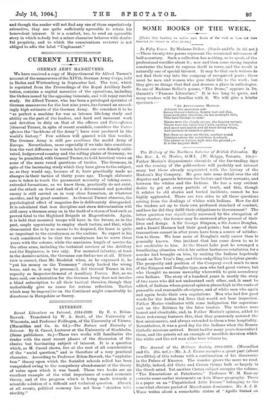The History of the Northern Interior of British Columbia. By
the Rev. A. G. Morice, O.M.I. (W. Briggs, Toronto. 10s.)— Father Morice's dispassionate chronicle of the fur-trading days and the coming of the gold-seekers will probably not interest many but those already acquainted with the history of the Hudson's Bay Company. He goes into some detail over the old disputes and quarrels between the factors and their servants, and between the whites and the Indians. He has a very evident desire to get at every particle of truth, and this, though it relates to old stories and buried incidents, cannot be too highly applauded. There are two sides to all these questions arising from the dealings of whites with Indians. How far did the traders act up to their own professed standard of conduct, and how far did they fulfil their obligations to Government? The latter question was significantly answered by the abrogation of their charter; the former may be answered after perusal of their lives and doings. A Sir George Simpson, a Sir James Douglas, and a Daniel Harmon had their good points ; but some of their transactions cannot in after years have been a source of satisfac- tion to them. We bear more of Douglas's early career than is generally known. One incident that has come down to us is not creditable to him. At the Stuart Lake post he revenged a humiliating situation which his rather barbarous retaliation for a murder had brought on him, by making the Indians hopelessly drunk on New Year's Day, and then cudgelling his helpless guests. The prosperity and position of the Company owed much to men of the Simpson and Douglas type, men who had great virtues, but who thought no means unworthy wherewith to gain ascendency over Indians. The story of a hundred years is mostly the story of two races who did not understand each other, and, it must be added, of Indians whom general opinion places high in the ranks of peaceable and reasonable aborigines, and of white men who again and again broke their own regulations. Men who had few good words for the Indian led lives that would not bear inspection. Father Merle° vindicates with some indignation the aspersions cast on the Babines by the later traders. The traders were honest and charitable, and, in Father Morice's opinion, added to their redeeming features this, that they generously assisted the first missionaries, and always extended to them a true hospitality. Nevertheless, it was a good day for the Indians when the Roman Catholic missions arrived. Drink had for many years demoralised them, and the priests set an example of unselfish devotion which the white and the red man alike bore witness to.


































 Previous page
Previous page